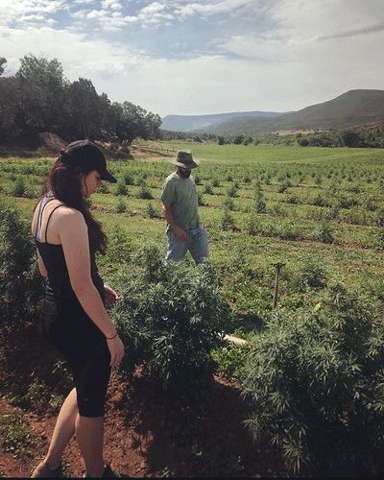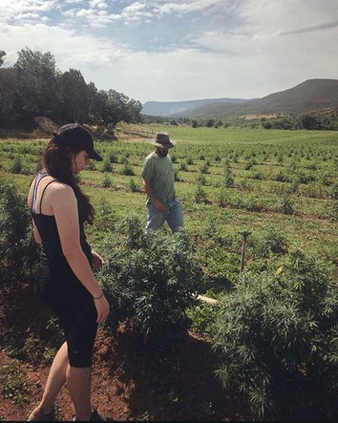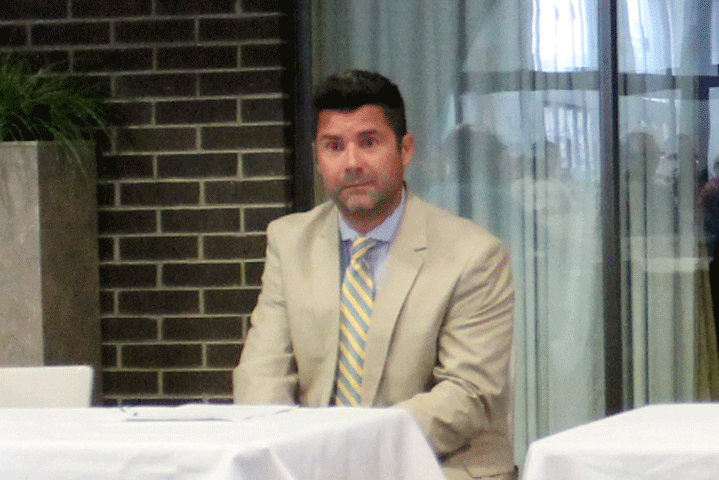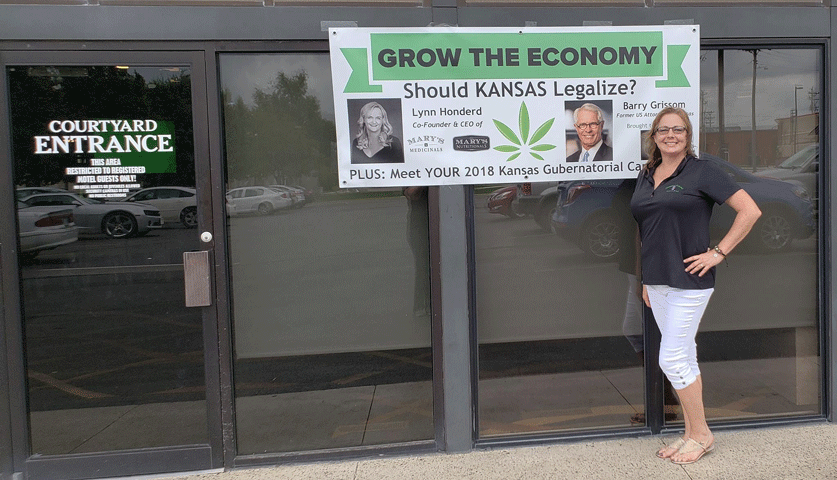Editor’s note: This is the second of two stories about information presented Monday at a public forum titled “Grow the Economy-- Should Kansas Legalize?”
John Bolsenga is a consultant and cannabis agriculturist and owner of Elevated Hemp. He spoke about his experience breaking into the medical marijuana industry in 2014, and how his company has evolved since.
Travelling to hospitals and medical offices throughout Kansas and Missouri over the years, Bolsenga became familiar with various pharmaceutical salespeople. He began to make the connection between the pharmaceutical industry, and the work he was performing on radiology and other equipment, and that connection didn’t sit well with him.
In 2014, he and his wife moved to Colorado as many others did in search of the readily available relief from pain offered by the medical and recreational marijuana industries that developed after voters approved legalization of both in 2013.
“We heard we could get out there, establish residency, apply for the card and start shopping,” Bolsenga said.
Diving into the industry
His wife began working as a ‘budtender,’ essentially the retail contact person who assists customers in a cannabis dispensary. The couple began growing the legal limit of marijuana plants and Bolsenga learned he was good at growing. He applied for a commercial grower’s license so he could expand his operation and sell to wholesalers, and began networking and attending seminars and growers expos.
CBD, industrial hemp, and seed production were new terms on the scene. CBD was becoming the new buzzword, so Bolsenga investigated further.
CBD, or cannabidiol, is a naturally occurring chemical compound derived from a strain of cannabis, Cannabis Sativa. It has been used medically to relieve seizures and provide pain relief in some patients.
Cannabis Sativa is also known as industrial hemp. Industrial hemp looks like marijuana and smells like marijuana, but has virtually no THC ( the naturally occurring chemical compound in marijuana that produces a psychoactive effect, or “high”), but high concentrations of CBD. And, Bolsenga learned,there were many other uses for the plant.
Some include food and livestock feed, livestock bedding, fiber for clothing, oil, and cement. And it had a wide appeal to one of the biggest demographics — the Baby Boomers.
“I began to find my niche,” he said.
The next couple of years brought many learning opportunities, he shared. He learned about growing organically, what his customer base demanded, and even made his first foray into growing industrial hemp. That didn’t exactly end favorably.
“I got burned from a bad partnership, so now I had to make up my money,” he said. He lost around $30,000 in the process of leasing land, buying equipment and “getting stuff done.” To make up the loss, he needed to figure out how to sell CBD. Again, through networking, he made vital connections, and today he bills himself as a consultant to others who want to get into the industrial hemp and CBD game.


Predictions
Bolsenga predicts that when, not if, industrial hemp becomes legal in Kansas, it will lead to the creation of many jobs, will change the landscape of real estate and land values, and farmers are going to need advice from people like him to help them transition into a new market. His predictions are based on what he has witnessed firsthand in Colorado, and he believes that growth will be repeated in Oklahoma, which recently okayed medical marijuana, and in Missouri where a similar bill’s passage is anticipated in November. In a nutshell, he wants to help farmers get started, he said.
But, as long as it continues to be federally listed as a Schedule 1 narcotic, operating a cannabis business will remain tricky.
“Buy a lot of safes,” he advised. “You’re going to keep a lot of cash.”
Bolsenga recently had his bank account closed. When he tried to deposit a check, he was informedof the clousure and given a cashier’s check for the balance in his account. He went to another bank to attempt opening an account. He was denied. He was even denied a personal account. The bank officers there found his website and noted he is a cannabis farmer.
He learned the importance of strategic planning for business, generically naming his LLC and generally setting business up right from the start so he could cash check. Bolsenga insisted it’s all above board.
‘I happen to have a greeneries business,” he said. ‘I just happen to be growing cannabis this year. I could grow beans next year if I wanted to.”
His final words of advice: you can’t afford to run the business from seed to sale. People who pick a niche and stick with it do well.


Everyone thought once recreational use was legalized in Colorado, you were going to see really high THC products, you were going to see green leaves splashed all over the products, and it was basically going to be a race to see who could get highest the quickest.Eduardo Provencia, Attorney for Mary's Medicinals
Discreet use paying off for one retailer
Eduardo Provencia, the attorney for Mary’s Medicinals, etc. was on hand after Lynn Hondred, the founder of Mary’s, was unable to attend the event due to a sudden family issue.
“There’s a lot of misinformation about this industry,” he said. “This, despite the fact that 30 states that now have legalized either medical or recreational use or both.”
He spoke about the economic benefit of those directly involved in the industry, but also the ancillary benefit realized as those workers move out into the community spending their paychecks. That, he said, has added up to between $40 -$50 billion nationwide.
Mary’s Medicinals was founded April 2013. Lynn Hondred voted against recreational marijuana in Colo., Provencia said. She was leery about recreational, but saw the business opportunity that came with it.
“Everyone thought once recreational use was legalized in Colorado, you were going to see really high THC products, you were going to see green leaves splashed all over the products, and it was basically going to be a race to see who could get highest the quickest,” Provencia said.
Mary’s went the opposite direction. They focused on medicinal products, and modeled the company on three basic principles: discreet use, pharmaceutical grade delivery, and accurate dosage.
This answers the concerns of many people who might like to try the products to relieve anxiety, PTSD, arthritis, pain and nausea are concerned because they don’t want to smoke or get high. This was the right approach for Mary’s. They started with a transdermal patch, winning a federal patent as the first marijuana company to allow such a delivery of cannabinoids into the human body.
The started Mary’s Nutritionals to respond to the CBD product, which can be sold legally in states where THC is still illegal.
Mary’s brings new cannabinoids to the consumer, and strives to be first. With a staff of chemists and doctors, they take a “craft beer mentality” to crafting their products, isolating cannabinoids and determining how to add them to nutritional products, Provencia said.
He described the company’s demographic as neutral, marketing to soccer moms, older consumers, people who otherwise wouldn’t smoke, and people who used to smoke and now have families and don’t want their kids to find their paraphernalia.
More legal stuff
As one of the larger national brands, the status comes with many legal headaches. Provencia shared about some of the legal hurdles the company was faced with early on which led to the creation of a diversified group of businesses that enables Mary’s Medicinals to lessen its federal tax burden.
This was necessary, he said, because while all forms of cannabis are currently federally listed narcotics, income is taxed at a very high rate, but write-offs are not allowed. To combat this, companies need to consider using neutral and ambiguous sounding names, and structure the company so that equipment and real estate, for instance, is not legally owned and operated by the arm that actually “touches” the illegal substance. He shared considerations to keep in mind when setting up a cannabis related business.


Local entrepreneur organized event
Jan Morton of Essential Elements, a Great Bend store, helped to organize the event. In her own company, she went to lengths to ensure that the local law enforcement agencies understand that her CBD products are legal, containing virtually no THC, she said.
After working for 12 years as a nurse in Hoisington, she suffered from chronic pain which she treated with pills before she found this natural alternative. They’ve helped her, and others, so she decided to open a store.
Morton is in favor of legalizing marijuana so people in Kansas can experience the relief products made from marijuana can provide, she said in a previous Tribune interview.





